Question 1:
Put these sentences from the story in the right order and write them out in a paragraph.
Don’t refer to the text.
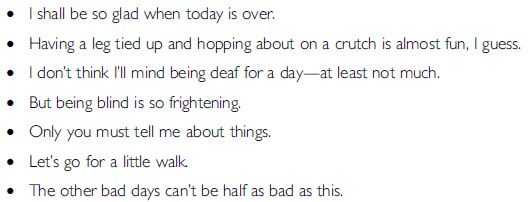
Answer:
Let’s go for a little walk. Only you must tell me about things. I shall be so glad when today is over. The other bad days can’t be half a bad as this. Having a leg tied up and hopping about on a crutch is almost fun, I guess. I don’t think I’ll mind being deaf for a day—at least not much. But being blind is so frightening.
Question 2:
Why do you think the writer visited Miss Beam’s school?
Answer:
The writer visited Miss Beam’s school to see the ways in which her school was different from other schools.
Question 3:
What was the ‘game’ that every child in the school had to play?
Answer:
Every child in the school had to perform the role of a blind, lame, deaf and an injured person once every term.
Question 4:
“Each term every child has one blind day, one lame day...” Complete the line. Which day was the hardest? Why was it the hardest?
Answer:
Each term every child has one blind day, one lame day, one deaf day, one injured day and one dumb day. According to the child, the blind day was the hardest because their eyes were to be covered with bandage and they weren't able to see anything. Also, there was a fear of getting hit by something every moment.
Question 5:
What was the purpose of these special days?
Answer:
The purpose of these special days was to make children understand misfortune by being a part of it themselves.
Question 6:
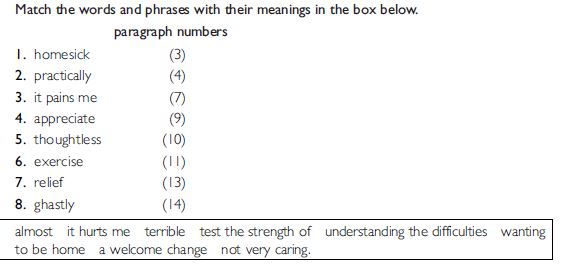
Answer:
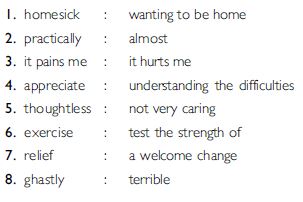
Question 7:
Re-word these lines from the story:
I had heard a great deal about Miss Beam’s school.
Answer:
The writer had heard a lot about Miss Beam’s school.
Question 8:
Re-word these lines from the story:
Miss Beam was all that I had expected—middle-aged,
full of authority.
Answer:
The writer found Miss Beam just as he had imagined her to be-middle-aged and full of authority.
Question 9:
Re-word these lines from the story:
I went to the window which overlooked a large garden.
Answer:
The writer went to the window from where he could see a large garden.
Question 10:
Re-word these lines from the story:
“We cannot bandage the children’s mouths, so they
really have to exercise their will-power.”
Answer:
Miss Beam told the writer that they could not bandage children’s mouths, so they had to use their will-power.
Question 11:
Given below is a page from a dictionary. Look at it carefully and
Find a word which means
the same as ghastly.
Write down the word and its two meanings.
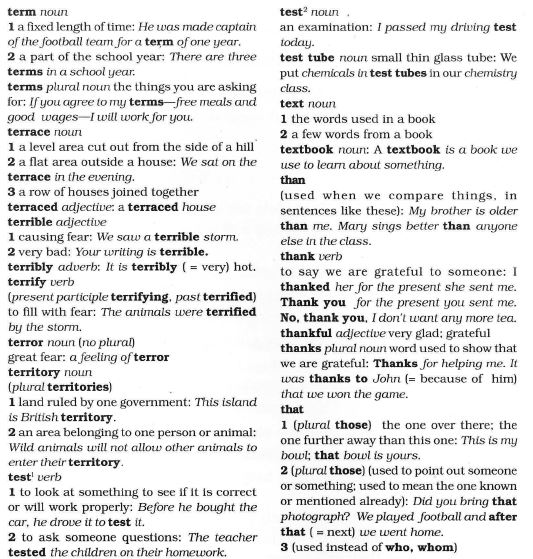
Answer:
terrible
meanings: a) causing fear, b) very bad
Question 12:
Given below is a page from a dictionary. Look at it carefully and
Find a word meaning a
part of the school year.

Answer:
term
Question 13:
Given below is a page from a dictionary. Look at it carefully and
Find a word that means
examination.

Answer:
test
Question 14:
Now make lists of
all the words on the page (plus any more that you can think of) that
begin with terr

Answer:
terrace, terrible, terrific, terrified, terror
Question 15:
Now make lists of
ii) five words that may follow the last word on the page, that

Answer:
thataway, thatch, thatcher, thatcherite, thaw
Question 16:
Now make lists of
write down your own meaning of the word thank. Then write down the
meaning given in the dictionary.

Answer:
to express gratitude to; to say we are grateful to someone.
Question 17:
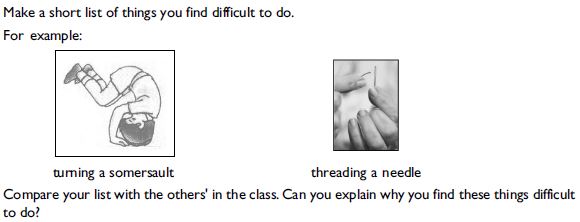
Answer:

Question 18:
Look at your hands carefully. Now write down for each finger one action for which that finger is particularly important. For example the second (or index) finger helps to hold the knife down firmly when cutting.
Answer:
Fingers are used by everyone to communicate certain things.
For example: We use a thumb
to wish someone all the best.
We use our index finger or a pointer to give directions.
We use our fourth finger to wear a ring.
